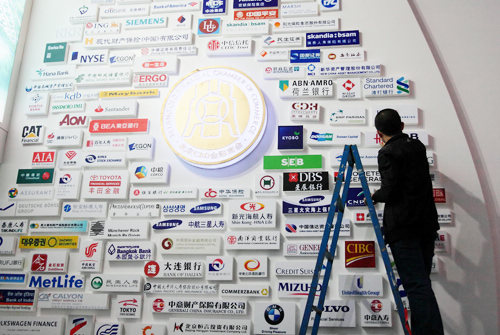|
 |
|
WALL OF INVESTORS: A worker hangs signs with the names of companies on a wall at the Seventh Beijing International Financial Expo on November 3-6 (ZHAN MING) |
For China, after more than 30 years of market-oriented reforms and a decade of WTO membership, the fight for status as a market economy has still been a tough brawl.
Over the past three decades, China has impressed the world with significant progress in market-oriented reforms. So far, 97 WTO members have granted China market economy status.
But its major trade partners, such as the European Union (EU), the United States, Japan and India, are still hesitant to follow suit.
It's really a matter of time before China wins the status. Based on WTO rules, China's full market economy status will automatically be recognized by 2016. Early recognition would provide relief for the country's exporters reeling from growing trade disputes.
"Western countries have been using the market economy status to practice trade protectionism against China," said Song Hong, a researcher from the Institute of World Economics and Politics under the Chinese Academy of Social Sciences (CASS).
China has been the world's biggest target of anti-dumping measures for the past 16 years. In 2010, China underwent 23 anti-dumping probes, making up 33 percent of the world's total, according to data from the Ministry of Commerce.
Dumping is determined in one of two ways: Either a commodity is sold abroad at a price lower than the price at home or lower than its production costs.
Since China has not been considered a market economy by Western countries, the costs in Chinese markets are regarded as unreliable and are therefore not used for calculating dumping margins.
Instead, Western countries select the prices of a substitute country—often with much higher production costs than China, making Chinese companies vulnerable to anti-dumping and anti-subsidy investigations.
"The low prices that Chinese exporters charge reflect true market conditions in low-cost China, and do not result from subsidies and other distortions typical of a command economy," said Song.
The so-called technical criteria of Western countries have been an obstacle for China, said China's Vice Foreign Minister Fu Ying.
Strictly speaking, several other countries that the EU has recognized as market economies, even some EU members, have failed to fully meet these criteria, said Fu.
The EU should treat China fairly on the market economy status issue, she said.
"The United States uses China's market economy status as a bargaining chip to press China to compromise on issues such as the yuan exchange rate against the U.S. dollar and U.S. Treasury securities," said He Weiwen, an executive director of the China Society for WTO Studies.
The United States in 2002 recognized Russia as a market economy, though it still has not obtained WTO membership, he said.
| 